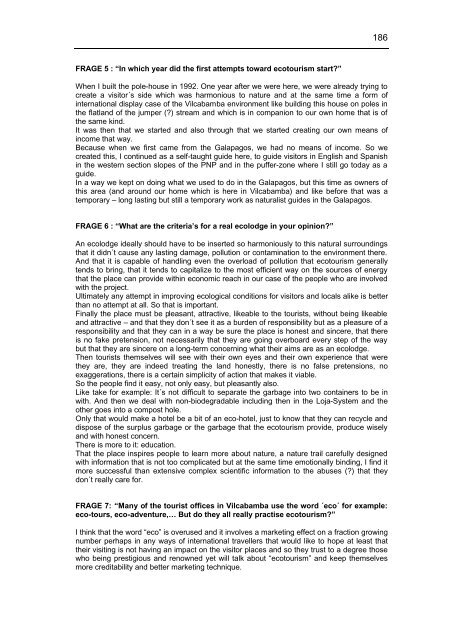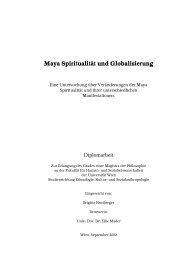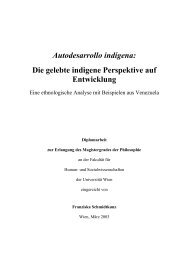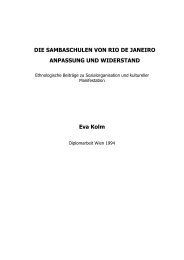Ökotourismus zwischen Sein und Schein - Lateinamerika-Studien ...
Ökotourismus zwischen Sein und Schein - Lateinamerika-Studien ...
Ökotourismus zwischen Sein und Schein - Lateinamerika-Studien ...
Erfolgreiche ePaper selbst erstellen
Machen Sie aus Ihren PDF Publikationen ein blätterbares Flipbook mit unserer einzigartigen Google optimierten e-Paper Software.
FRAGE 5 : “In which year did the first attempts toward ecotourism start?”<br />
186<br />
When I built the pole-house in 1992. One year after we were here, we were already trying to<br />
create a visitor´s side which was harmonious to nature and at the same time a form of<br />
international display case of the Vilcabamba environment like building this house on poles in<br />
the flatland of the jumper (?) stream and which is in companion to our own home that is of<br />
the same kind.<br />
It was then that we started and also through that we started creating our own means of<br />
income that way.<br />
Because when we first came from the Galapagos, we had no means of income. So we<br />
created this, I continued as a self-taught guide here, to guide visitors in English and Spanish<br />
in the western section slopes of the PNP and in the puffer-zone where I still go today as a<br />
guide.<br />
In a way we kept on doing what we used to do in the Galapagos, but this time as owners of<br />
this area (and aro<strong>und</strong> our home which is here in Vilcabamba) and like before that was a<br />
temporary – long lasting but still a temporary work as naturalist guides in the Galapagos.<br />
FRAGE 6 : “What are the criteria’s for a real ecolodge in your opinion?”<br />
An ecolodge ideally should have to be inserted so harmoniously to this natural surro<strong>und</strong>ings<br />
that it didn´t cause any lasting damage, pollution or contamination to the environment there.<br />
And that it is capable of handling even the overload of pollution that ecotourism generally<br />
tends to bring, that it tends to capitalize to the most efficient way on the sources of energy<br />
that the place can provide within economic reach in our case of the people who are involved<br />
with the project.<br />
Ultimately any attempt in improving ecological conditions for visitors and locals alike is better<br />
than no attempt at all. So that is important.<br />
Finally the place must be pleasant, attractive, likeable to the tourists, without being likeable<br />
and attractive – and that they don´t see it as a burden of responsibility but as a pleasure of a<br />
responsibility and that they can in a way be sure the place is honest and sincere, that there<br />
is no fake pretension, not necessarily that they are going overboard every step of the way<br />
but that they are sincere on a long-term concerning what their aims are as an ecolodge.<br />
Then tourists themselves will see with their own eyes and their own experience that were<br />
they are, they are indeed treating the land honestly, there is no false pretensions, no<br />
exaggerations, there is a certain simplicity of action that makes it viable.<br />
So the people find it easy, not only easy, but pleasantly also.<br />
Like take for example: It´s not difficult to separate the garbage into two containers to be in<br />
with. And then we deal with non-biodegradable including then in the Loja-System and the<br />
other goes into a compost hole.<br />
Only that would make a hotel be a bit of an eco-hotel, just to know that they can recycle and<br />
dispose of the surplus garbage or the garbage that the ecotourism provide, produce wisely<br />
and with honest concern.<br />
There is more to it: education.<br />
That the place inspires people to learn more about nature, a nature trail carefully designed<br />
with information that is not too complicated but at the same time emotionally binding, I find it<br />
more successful than extensive complex scientific information to the abuses (?) that they<br />
don´t really care for.<br />
FRAGE 7: “Many of the tourist offices in Vilcabamba use the word ´eco´ for example:<br />
eco-tours, eco-adventure,… But do they all really practise ecotourism?”<br />
I think that the word “eco” is overused and it involves a marketing effect on a fraction growing<br />
number perhaps in any ways of international travellers that would like to hope at least that<br />
their visiting is not having an impact on the visitor places and so they trust to a degree those<br />
who being prestigious and renowned yet will talk about “ecotourism” and keep themselves<br />
more creditability and better marketing technique.





